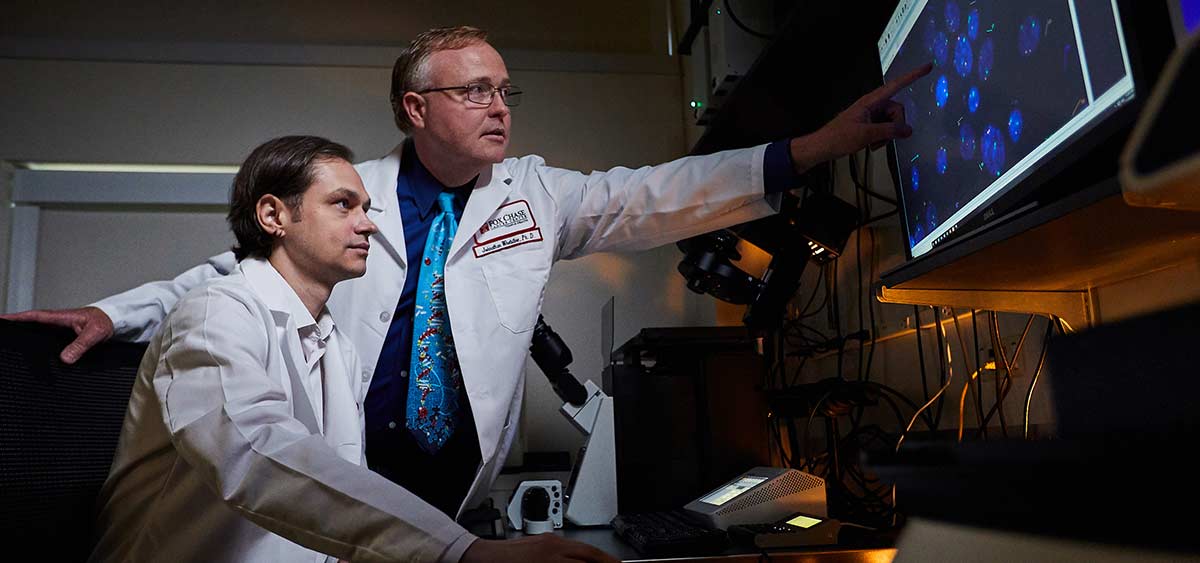
Epigenetics: A New Frontier in Cancer Treatment
-
You may have heard that mutations in certain genes can lead to the development of cancer. But, did you know that factors influencing how a gene functions can also cause cells to become cancerous?
There is an exciting area of research that’s gaining traction among cancer experts, and it’s called epigenetics. “Epi” meaning what is on or around and “genetics” which refers to the study of DNA. Epigenetics is the study of how modifications to DNA and to the environment surrounding DNA (the epigenome) impact the way our genes are expressed and the stability of DNA without changing its sequence.
Relating Epigenetics to Language
Modifications to the epigenome are like modifications to a sentence. Sometimes, the modified sentence can carry on without much difference, while other times, the modification can make a BIG, even life-altering, difference.
For example:
Let’s eat, grandma!
Let’s eat grandma!
Chemical modifications to DNA and/or the proteins that help wrap the 6 feet of DNA in every cell (histones) are just two examples of epigenetic changes that can impact gene expression in cells and lead to cancer (in some circumstances).
Impact of Epigenetics
Modifications to the epigenome affect the regulation of our genes. For example, epigenetic regulation of key genes "tell” a liver cell to be a liver cell versus a brain cell. If chemicals or modifiers of the epigenome cause a faulty instruction, a gene in a cell might stop working the way it should, and this can promote the development of cancer and other diseases.
“Each cell in our body has a designated function. The epigenome controls the DNA in every cell, allowing cells to become who they are,” said Johnathan R. Whetstine, PhD, program leader of the Cancer Epigenetics Program and Jack Schultz Basic Science Chair at Fox Chase Cancer Center. “In the case of cancer, cells grow out of control. We are finding that the role of the epigenome is extremely important in determining whether cells will continue to function as intended or become uncontrollable.”
One epigenetic modification that is of much interest to cancer biologists is that of methylation. Think of methylation like the addition of an inappropriate comma in a sentence—like in the example above. A methyl compound latches onto a strand of DNA, or a histone, so the genes are expressed correctly, or the DNA is kept stable. However, erasing or misplacing this modification can cause the cell to behave in a way that was not intended. Similar to how the displaced comma changed the sentence above.
More and more, experts are learning how disruption of the epigenome and factors controlling it can lead to the development of blood cancer and solid tumors. By identifying the factors controlling the epigenome and understanding how the epigenome impacts normal and cancerous cells, we are able to identify characteristics that can be used to monitor a disease (novel biomarkers) to help with early detection, prevention, and treatment.
Scientists and clinicians know that DNA methylation abnormalities occur in many cancers; and now, they are being targeted with therapies in the clinic. Additional drugs are being created to control factors in the epigenome responsible for the placement of this chemical modification on histones. In January 2020, one such drug became the first FDA-approved epigenetic therapy targeting histone methylation for the treatment of a rare type of sarcoma and is now being considered for relapsed/refractory follicular lymphoma.
Epigenetics and Cancer Treatment—Today and Tomorrow
The future of this area of cancer biology is bright. We are identifying new factors, controlling epigenetics, and beginning to understand how to use these findings to control cancer cells. Knowing that some cancers are driven by epigenetic disruption creates opportunities for the development of new types of treatments.
Researchers are also identifying how epigenetics can be controlled so that we can:
- “Remind” cancer cells of their intended function
- Stop cancer cells from dividing and destroy them
- Prevent cancer cells from becoming resistant to therapy
Major cancer centers like Fox Chase are committed to uncovering more about how epigenetic disruptions drive cancer and what can be done to stop them.
“Epigenetic understanding can help us inform physicians on how to use new combinations of drugs and which drugs they may want to consider for certain patients,” Whetstine said. Over time, this research will lead to the identification of new ways to disrupt and reestablish epigenetics so that cancer can be more effectively targeted.
Learn more about how the Cancer Epigenetics Program at Fox Chase Cancer Center is helping to develop new treatments for cancer.
